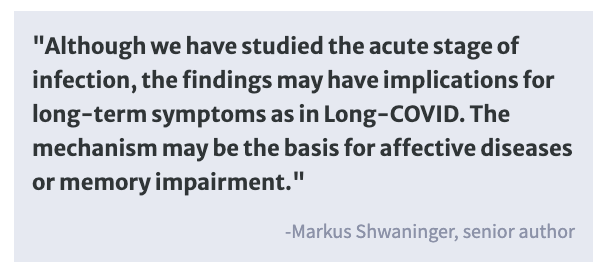An Enzyme Made by the COVID-19 Virus Can Destroy Brain Blood Vessels
Post by D. Chloe Chung
The takeaway
The COVID-19 virus produces a protein enzyme. This enzyme can damage blood vessels in the brain by NEMO, a protein essential for the survival of brain endothelial cells (i.e. cells lining blood vessels).
What's the science?
Many COVID-19 patients report experiencing a wide range of neurological and psychiatric symptoms. Several studies have found that blood vessels and the blood-brain barrier can be disrupted in the brain of COVID-19 patients. Yet, it was unclear how blood vessels in the brain can be damaged due to infection with SARS-CoV-2, the virus that causes COVID-19. Recently in Nature Neuroscience, Wenzel and colleagues demonstrated how a major enzyme produced by the COVID-19 virus can kill endothelial cells and destroy blood vessels in the brain.
How did they do it?
The authors first determined the degree of brain blood vessel pathology induced by COVID-19 by staining brain tissue of people who passed away from COVID-19 with antibodies against endothelial cell markers and collagen. They defined thin tubes of collagen without the endothelial cell marker as damaged blood vessels. The authors performed a similar analysis using brain samples of mouse and hamster models infected with the COVID-19 virus. To determine whether protein-cleaving enzymes made by the COVID-19 virus can be the culprit of blood vessel damage, the authors incubated the purified enzyme with a protein called NEMO that is essential for host cell immune response. They also tested whether the enzyme can subsequently affect the brain endothelial cell survival as well as inflammatory pathways downstream of NEMO. Using a conditional knockout mouse model, the author directly manipulated NEMO in the brain’s endothelial cells to examine if it is sufficient to induce vascular pathology in the brain. The authors also used this mouse model to further investigate potential therapeutic strategies against the vascular pathology in COVID-19 by genetically deleting or pharmacologically inhibiting kinases important in cell survival.
What did they find?
First, the authors found that the brain tissue from COVID-19 patients contained more “string vessels,” which are capillaries remaining after the death of blood vessels, compared to control brain tissue. String vessels were also increased in animal models of COVID-19, suggesting that COVID-19 can induce microvascular pathology in the brain. Next, the authors found that the enzyme (termed Mpro) made by the COVID-19 virus can cleave NEMO, a protein critical for the survival of brain endothelial cells. Mpro was found to not only chop off NEMO but also impair inflammatory responses downstream of NEMO. Interestingly, the authors learned that endothelial cells expressing this enzyme are more likely to die than cells without it, which suggests that Mpro can indeed induce endothelial cell death. Importantly, this effect was absent when Mpro was mutated to lose its protein-cleaving ability. These findings show that the enzymatic activity of Mpro is critical for cell death and vascular pathology.
What's the impact?
This study has suggested one of the potential mechanisms through which the COVID-19 virus can damage the brain — which could potentially contribute to the neurological symptoms seen in COVID-19 patients. Notably, this work is the first to evaluate vascular pathology in the brain based on the presence of string vessels. Future investigation into ways to protect brain blood vessels may help alleviate or prevent neurological issues in COVID-19 patients.


